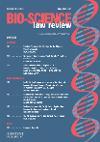Bio-Science Law Review - Volume 18 - Issue 5

ARTICLES
FINDING TECHNICAL CONTRIBUTION IN THE PHARMA PATENT LIFECYLE
PAUL ENGLAND
Taylor Wessing, London
Technical contribution is a requirement that runs through all forms of patented subject matter, including products in the pharma and biologics lifecycle. Where the technical contribution appears to be most difficult to identify is in sub-population claims. This is an issue that the English courts have not yet addressed but, as life sciences research moves in this direction, it can be expected to arise soon. It is submitted that guidance on this issue comes from the EPO: the line of technical contribution is drawn between an explanation of a mechanism which underlies a use already described in the prior art, on the one hand, and a clearly defined and detectable marker, on the other.
REVISION OF THE JAPANESSE PLANT VARIETY PROTECTION AND SEED ACT
KLAUS HINKELMANN
German and European
Patent Attorney, Munich
Recent Japanese legislation has significantly expanded the scope of plant breeders’ rights by protecting local producers from the impact of unauthorised overseas cultivation and improving the enforcement of their rights. Under a new system, the production areas of registered varieties can be limited to designated areas within Japan, so when registering their species, plant breeders are able to stipulate where their varieties may be grown and exported.
LIFE SCIENCES : WHAT TOO EXPECT IN 2022
HARRIET HANKS, JENNIFER BETHLEHEM, ADAM GOLDEN, MAY SMITH, LAURA WHITING AND JENNY LEAHY
Freshfields Bruckhaus Deringer LLP, London
Innovation and transformation are the watchwords for life sciences in 2022. Digitisation and personalisation trends are set to continue (with AI, data and MedTech primed to play an increasingly prominent role), while regulators grapple to fit new modalities into existing legal frameworks. This article previews likely developments in these areas, including those relating to acquisition activity, competition, disputes, IP and tax.
CASE COMMENTS
ARTIFICAL INTELLIGENCE AS INVENTOR AT THE COURT OF APPEAL
STEPHEN THALER v COMPTROLLER GENERAL OF PATENTS TRADEMARKS AND DESIGNS
DR PHIL MERCHANT
Chartered (UK) and European Patent Attorney, Marks & Clerk LLP, London
Following a discussion on procedural points, the UK Court of Appeal has upheld a decision of the High Court to reject two patent applications where an AI computer program was named as inventor, thus maintaining the status quo regarding the naming of an AI as inventor in the UK. The question remains important as increasingly complex AI programs are replacing decisions previously taking place in the human mind that would normally merit that human being being named as inventor.
COMBINATION PRODUCTS AND SUPPLEMENTARY PROTECTION CERTIFICATES: WILL NEW CJEU REFERRALS PROVIDE MUCH NEEDED CLARITY
ALASDHAIR MCDONALD
Senior Associate, Pinsent Masons, London
Two recent referrals offer the CJEU the opportunity to consider the operation of Articles 3(a), (c) and (d) of the SPC Regulation and to clarify how these Articles work in conjunction with one another and whether the Actavis authorities still apply. This should assist national courts in determining the validity of combination SPCs.
DIVISIONALS FROM A PCT(UK)PATENT APPLICATION: BEWARE THE LURKING COMPLIANCE DATE!
WILLIAM BURRELL
D Young & Co LLP, London
In the context of an international patent application, for those contemplating divisional patent protection relating to the UK, it is always worth considering whether such protection should be sought sooner rather than later. Earlier entry into the UK national phase may provide more time to navigate the examination for all required divisional patent applications that might be contemplated.
IT'S ALL SYSTEMS GO FOR THE UNIFIED PATENT COURT
PAUL ENGLAND
Taylor Wessing, London
Only the mandatory ratification by Germany is now required for the UPC to enter fully into force. The provisional period is underway, and recruitment of judges has begun. The location of the branch of the central division deciding the validity of patents for life sciences subject matter is still to be decided.
NEWS
EUROPEAN REPORTS
The Creation of Unitary SPCs and a ‘Unified’ Procedure for Granting SPCs: The European
Commission Announces Proposals – Patents: New Principles in Preliminary Injunction Proceedings
